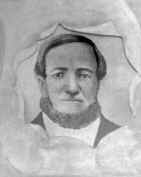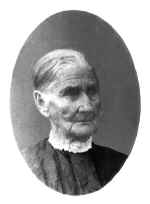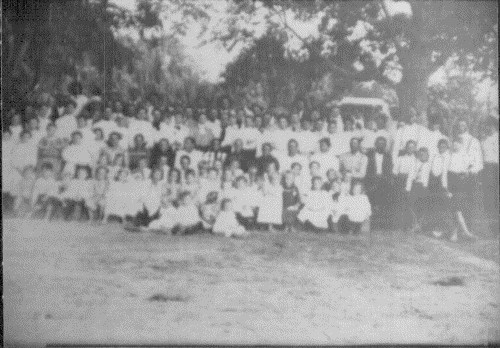A History of the Frederick George Smith Family of Johnsonís Bayou, La.
By W. T. Block
 Frederick
George Schmidt was born in Dresden, Germany on Aug. 22, 1806, and very little is
known about his early life. Apparently he became a sailor, probably as an
apprentice, sailing out of the port of Bremen. It is believed he was on his 3rd
voyage to Galveston, hauling cotton, when he decided to jump ship and become an
American. He settled on Johnsonís Bayou about 1839, or about the same time as
his fellow German immigrant, Dr. Frederick Erbelding, settled there.
Frederick
George Schmidt was born in Dresden, Germany on Aug. 22, 1806, and very little is
known about his early life. Apparently he became a sailor, probably as an
apprentice, sailing out of the port of Bremen. It is believed he was on his 3rd
voyage to Galveston, hauling cotton, when he decided to jump ship and become an
American. He settled on Johnsonís Bayou about 1839, or about the same time as
his fellow German immigrant, Dr. Frederick Erbelding, settled there.
Many believe that Schmidt was the pioneer cotton planter and
ginner on the bayou, since his predecessors - the Griffiths, Johnsons, Barrows,
Berwicks - were all cattlemen. Schmidt carried the German spelling of his
surname until his death, but his wife and children refused it, anglicizing it to
Smith. Nevertheless his name remains all over the place as Smith Ridge, Smith
Ridge Road and Smith Cemetery.
 Schmidt chose the Smith Ridge, which it is about 8 miles long
and as wide as a half-mile in places, to become the site of his cotton
plantation and gin because of its rich alluvial soil. In 1842 he married a
15-year-old young lady, Caroline Matilda Beadle, who was an orphan born in
Abbeville. They became the parents of 14 children. Matildaís origin is much
disputed, the 1880 census noting that her father was born in Indiana and her
mother in Louisiana. It was not known though whether they were her adoptive
parents or biological parents, and one source said she was raised by a lady
named Sally Hutchins.
Schmidt chose the Smith Ridge, which it is about 8 miles long
and as wide as a half-mile in places, to become the site of his cotton
plantation and gin because of its rich alluvial soil. In 1842 he married a
15-year-old young lady, Caroline Matilda Beadle, who was an orphan born in
Abbeville. They became the parents of 14 children. Matildaís origin is much
disputed, the 1880 census noting that her father was born in Indiana and her
mother in Louisiana. It was not known though whether they were her adoptive
parents or biological parents, and one source said she was raised by a lady
named Sally Hutchins.
The
early years of the Schmidt-Beadle marriage were marked by unbelievable
hardships, but the bayou pioneers soon learned to improvise early or do without.
They made their own lye soap, using ashes and tallow; tanned hides with tannic
acid boiled from oak bark; and spun yarn from cotton and wool with their
spinning wheels. None of the Smith children fought in the Confederate Army
because the 6 oldest (except a son who died young) were all girls.
The Civil War did bring about many changes. Occasionally a
blockade-runner carried cotton from the bayou through the blockade. Confederate
cavalry were always nearby, either on patrol or rounding up wild cattle for the
Sabine Pass garrison. And the Confederate troops and Union prisoners from the
Battle of Calcasieu Pass passed in each direction through Johnsonís Bayou. Two
small Confederate steamboats, the Ace and Dime, hauled fresh water to Sabine
Pass and loaded or unloaded troops. And throughout the war Frederick Schmidt
raised and ginned 30 or 40 bales of cotton annually and ginned all the cotton of
his neighbors.
The Civil War era residents of the bayou learned to improvise
even more. They made buttons out of dried gourds or watermelon seeds; shoe soles
out of rawhide or wood; needles out of fish bones; and combs sawed out of wood.
They wove cloth on handlooms, which they sewed into shirts, dresses, trousers,
and coats. Firewood was always in short supply, and settlers retrieved every
piece that washed up on the beach; every tree floating through the lake, or
brought logs from the burned-out sawmill at Sabine Pass.
The Schmidt-Smith progeny included Louisa, born Feb. 19,
1843; Lorne Jane, b. April 18, 1845; Emaline, b. Feb. 3, 1848; Ursula (the
writerís grandmother), b. May 16, 1849; Earnest, died young; Sarah, b. May 18,
1855; Elizabeth, b. 1854; Emory, b. Mar. 11, 1856; Laura, b. Jan. 6, 1857;
August, b. 1859; William, b. Jan. 18, 1861; Albert, b. Dec. 8, 1862; Otis, b.
1865; and Alonzo, b. Feb. 21, 1867.
Between Sept. 13, 1865 and Aug. 22, 1879, a series of
hurricanes hit Johnsonís Bayou in every odd year, although some were side
effects of major storms that struck the Texas coast. Yet none compared to the
worst of them, that of Oct. 12, 1886, which drowned 110 persons at Johnsonís
Bayou, and caused most of the Smith children to resettle in Texas. Yet Frederick
and Matilda clung to the bayou like barnacles to a boatís bottom until
Frederickís death on Feb. 21, 1877. However Matilda and some of her sons
farmed the old homestead until 1914.
Louisa Smith married Charles Block, and died in Orange, Texas
in 1932; Lorne Jane married George L. Block and died at Orange; Ursula married
Albert Block and died at Port Neches, Texas in 1914 (the Block sons-in-law were
brothers and Confederate veterans as was John Kleine). Emaline married Kleine
and died at Beaumont in 1910; Sarah married John Green and died at Orange in
1922.
Elizabeth married Jack Simon in Orange; Emory "Bud"
Smith married Laura Peveto and died at Nederland, Texas in 1929; Laura married
D. W. Sampson and died in Houston in 1931; August "Gus" Smith married
Tassie Peveto and died on Cow Bayou, Orange Co., in 1928.
William married Caroline Labeth and died at Johnsonís Bayou
in 1904; Albert married Mattie Erbelding and died at Port Neches in 1931; Otis
married Louella Peveto and died at Johnsonís Bayou in 1893; and Alonzo married
Sarah Rogers and died at Johnsonís Bayou in 1894.
An unusual phenomenon occurred to Laura and Tassie Peveto
Smith while they were still alive in 1936. Their half-brother, Michael Peveto,
had fought at the Battle of San Jacinto, which freed Texas from Mexico, a
century earlier in 1836. There was also an old saying on the bayou: "Donít
talk about the Smiths to the Pevetos and Erbeldings because they are all kin to
each other."
 There was also a giant Smith-Block reunion at Port Neches in
June 1907, to honor Grandma Matilda Smith on her 80th birthday. There were
present 186 people who were her direct descendents, and 4 steamboats had brought
them to Blockís Bayou from Orange, Sabine Pass, Johnsonís Bayou, and
Beaumont. Many photographs survive that were taken at that reunion. Caroline
Matilda Smith died on Feb. 19, 1915, and she is buried beside her husband in
Smith Cemetery on Smith Ridge Road.
There was also a giant Smith-Block reunion at Port Neches in
June 1907, to honor Grandma Matilda Smith on her 80th birthday. There were
present 186 people who were her direct descendents, and 4 steamboats had brought
them to Blockís Bayou from Orange, Sabine Pass, Johnsonís Bayou, and
Beaumont. Many photographs survive that were taken at that reunion. Caroline
Matilda Smith died on Feb. 19, 1915, and she is buried beside her husband in
Smith Cemetery on Smith Ridge Road.
In 1992 a 223-page, hardback book, covering 8 generations of
Smith family descendents, was published by Mrs. Ruth McKinley of Beaumont.
